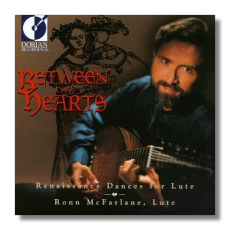
The Internet's Premier Classical Music Source
Related Links
- Latest Reviews
- More Reviews
-
By Composer
-
Collections
DVD & Blu-ray
Books
Concert Reviews
Articles/Interviews
Software
Audio
Search Amazon
Recommended Links
Site News
 CD Review
CD Review
Between Two Hearts

Renaissance Dances for Lute
- Anonymous:
- Branle Gay
- Galliarde
- La Magdalena
- La roque
- La Rote de Rode
- Puisquen deux cueurs
- Hans Judenkünig:
- Ain hoff dantz mit zway stimen
- Ain niderlendisch runden dantz
- Rossina ain welscher dantz
- Joan Ambrosio Dalza:
- Pavana alla veneziana in D Major
- Piva
- Saltarello
- Pietro Paulo Borrono:
- Pavana chiamata la Desperata
- Saltarello chiamato el Mazolo
- Saltarello
- Tocha tocha la Canella
- Vincenzo Capirola:
- Balletto
- La spagna
- Hans Neusidler:
- Ein guter welscher tantz
- Ein newes Lautenbüchlein mit vil schonen Liedern: "Der hupff auff" & "Ein guter Gassenhauer"
- Ein ser guter hoff tanz mit durch straichen
- Jean Baptiste Besard: Branle gay
- Simone Molinaro: Ballo detto il Conte Orlando
- Cesare Negri Milanesi: La gratie d'amore: "La nizzarda", La catena d'amore, So ben mi hà buon tempo, Spagnoletta
Ronn McFarlane, lute
Dorian DOR-90225
Catchy yet pensive, these dance suites convey something of the fascination with the art of love that pervades the Renaissance, a point not lost on Dorian's perceptive marketing staff. Dorian has released a host of thematically programmed early music designed to pique the interest of the novice as well as the seasoned collector. It works; particularly when you have such a sympathetic player as McFarlane, who sounds like your average guy who started his career on electric guitar, gravitated toward the lute, became a world class player, and who, incidentally, enjoys meditating and taking long walks by the shore. His partner for one suite, Mark Cudek, throws in a tidbit about being a competitive tri-athlete. They may be folksy, but don't tell them to get a life.
Works on this program mostly date from the early 1500's, when the European appetite for courtly dance was at its height. McFarlane has selected his favorites from among composers such as Joanambrosio Dalza, Pierre Attaingnant (a publisher of music actually), and Hans Judenkunig. The typical suite begins with a stately main dance (pavana or basse danse) and concludes with a faster, jumping dance (saltarello or hupfauf). McFarlane uses three different lutes by modern masters, selecting the one most appropriate to the music. My favorite of his lutes is an older 8-course; owing to its loose internal bracing, it imparts a unique twang to certain notes. The rustic effect is easily heard on the first suite by Attaingnant, where a series of trills in the Pavane are accompanied by a strummed, ground base.
Dorian uses a well-documented 20-bit technique, and this program was recorded in the revered Troy Savings Bank Music Hall. The good sound that is their hallmark is present here. Easily enjoyed.
Copyright © 1997, Robert J. Sullivan


















